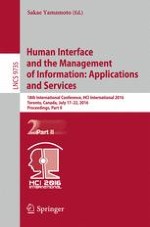2016 | OriginalPaper | Buchkapitel
A Method for Consensus Building Between Teachers and Learners in Higher Education Through Co-design Process
verfasst von : Ryota Sugino, Satoshi Mizoguchi, Koji Kimita, Keiichi Muramatsu, Tatsunori Matsui, Yoshiki Shimomura
Erschienen in: Human Interface and the Management of Information: Applications and Services
Aktivieren Sie unsere intelligente Suche, um passende Fachinhalte oder Patente zu finden.
Wählen Sie Textabschnitte aus um mit Künstlicher Intelligenz passenden Patente zu finden. powered by
Markieren Sie Textabschnitte, um KI-gestützt weitere passende Inhalte zu finden. powered by
